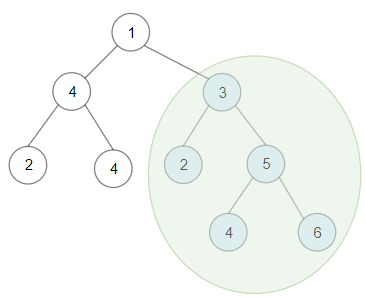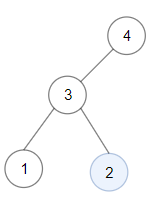| comments | difficulty | edit_url | rating | source | tags | |||||
|---|---|---|---|---|---|---|---|---|---|---|
true |
Hard |
1913 |
Biweekly Contest 21 Q4 |
|
Given a binary tree root, return the maximum sum of all keys of any sub-tree which is also a Binary Search Tree (BST).
Assume a BST is defined as follows:
- The left subtree of a node contains only nodes with keys less than the node's key.
- The right subtree of a node contains only nodes with keys greater than the node's key.
- Both the left and right subtrees must also be binary search trees.
Example 1:
Input: root = [1,4,3,2,4,2,5,null,null,null,null,null,null,4,6] Output: 20 Explanation: Maximum sum in a valid Binary search tree is obtained in root node with key equal to 3.
Example 2:
Input: root = [4,3,null,1,2] Output: 2 Explanation: Maximum sum in a valid Binary search tree is obtained in a single root node with key equal to 2.
Example 3:
Input: root = [-4,-2,-5] Output: 0 Explanation: All values are negatives. Return an empty BST.
Constraints:
- The number of nodes in the tree is in the range
[1, 4 * 104]. -4 * 104 <= Node.val <= 4 * 104
To determine whether a tree is a binary search tree, it needs to meet the following four conditions:
- The left subtree is a binary search tree;
- The right subtree is a binary search tree;
- The maximum value of the left subtree is less than the value of the root node;
- The minimum value of the right subtree is greater than the value of the root node.
Therefore, we design a function
- The number
$bst$ indicates whether the tree with$root$ as the root is a binary search tree. If it is a binary search tree, then$bst = 1$ ; otherwise$bst = 0$ ; - The number
$mi$ represents the minimum value of the tree with$root$ as the root; - The number
$mx$ represents the maximum value of the tree with$root$ as the root; - The number
$s$ represents the sum of all nodes of the tree with$root$ as the root.
The execution logic of the function
If
Otherwise, recursively calculate the left subtree and right subtree of
If
Otherwise, the tree with
We call
The time complexity is
# Definition for a binary tree node.
# class TreeNode:
# def __init__(self, val=0, left=None, right=None):
# self.val = val
# self.left = left
# self.right = right
class Solution:
def maxSumBST(self, root: Optional[TreeNode]) -> int:
def dfs(root: Optional[TreeNode]) -> tuple:
if root is None:
return 1, inf, -inf, 0
lbst, lmi, lmx, ls = dfs(root.left)
rbst, rmi, rmx, rs = dfs(root.right)
if lbst and rbst and lmx < root.val < rmi:
nonlocal ans
s = ls + rs + root.val
ans = max(ans, s)
return 1, min(lmi, root.val), max(rmx, root.val), s
return 0, 0, 0, 0
ans = 0
dfs(root)
return ans/**
* Definition for a binary tree node.
* public class TreeNode {
* int val;
* TreeNode left;
* TreeNode right;
* TreeNode() {}
* TreeNode(int val) { this.val = val; }
* TreeNode(int val, TreeNode left, TreeNode right) {
* this.val = val;
* this.left = left;
* this.right = right;
* }
* }
*/
class Solution {
private int ans;
private final int inf = 1 << 30;
public int maxSumBST(TreeNode root) {
dfs(root);
return ans;
}
private int[] dfs(TreeNode root) {
if (root == null) {
return new int[] {1, inf, -inf, 0};
}
var l = dfs(root.left);
var r = dfs(root.right);
int v = root.val;
if (l[0] == 1 && r[0] == 1 && l[2] < v && r[1] > v) {
int s = v + l[3] + r[3];
ans = Math.max(ans, s);
return new int[] {1, Math.min(l[1], v), Math.max(r[2], v), s};
}
return new int[4];
}
}/**
* Definition for a binary tree node.
* struct TreeNode {
* int val;
* TreeNode *left;
* TreeNode *right;
* TreeNode() : val(0), left(nullptr), right(nullptr) {}
* TreeNode(int x) : val(x), left(nullptr), right(nullptr) {}
* TreeNode(int x, TreeNode *left, TreeNode *right) : val(x), left(left), right(right) {}
* };
*/
class Solution {
public:
int maxSumBST(TreeNode* root) {
int ans = 0;
const int inf = 1 << 30;
function<vector<int>(TreeNode*)> dfs = [&](TreeNode* root) {
if (!root) {
return vector<int>{1, inf, -inf, 0};
}
auto l = dfs(root->left);
auto r = dfs(root->right);
int v = root->val;
if (l[0] && r[0] && l[2] < v && v < r[1]) {
int s = l[3] + r[3] + v;
ans = max(ans, s);
return vector<int>{1, min(l[1], v), max(r[2], v), s};
}
return vector<int>(4);
};
dfs(root);
return ans;
}
};/**
* Definition for a binary tree node.
* type TreeNode struct {
* Val int
* Left *TreeNode
* Right *TreeNode
* }
*/
func maxSumBST(root *TreeNode) (ans int) {
const inf = 1 << 30
var dfs func(root *TreeNode) [4]int
dfs = func(root *TreeNode) [4]int {
if root == nil {
return [4]int{1, inf, -inf, 0}
}
l, r := dfs(root.Left), dfs(root.Right)
if l[0] == 1 && r[0] == 1 && l[2] < root.Val && root.Val < r[1] {
s := l[3] + r[3] + root.Val
ans = max(ans, s)
return [4]int{1, min(l[1], root.Val), max(r[2], root.Val), s}
}
return [4]int{}
}
dfs(root)
return
}/**
* Definition for a binary tree node.
* class TreeNode {
* val: number
* left: TreeNode | null
* right: TreeNode | null
* constructor(val?: number, left?: TreeNode | null, right?: TreeNode | null) {
* this.val = (val===undefined ? 0 : val)
* this.left = (left===undefined ? null : left)
* this.right = (right===undefined ? null : right)
* }
* }
*/
function maxSumBST(root: TreeNode | null): number {
const inf = 1 << 30;
let ans = 0;
const dfs = (root: TreeNode | null): [boolean, number, number, number] => {
if (!root) {
return [true, inf, -inf, 0];
}
const [lbst, lmi, lmx, ls] = dfs(root.left);
const [rbst, rmi, rmx, rs] = dfs(root.right);
if (lbst && rbst && lmx < root.val && root.val < rmi) {
const s = ls + rs + root.val;
ans = Math.max(ans, s);
return [true, Math.min(lmi, root.val), Math.max(rmx, root.val), s];
}
return [false, 0, 0, 0];
};
dfs(root);
return ans;
}
